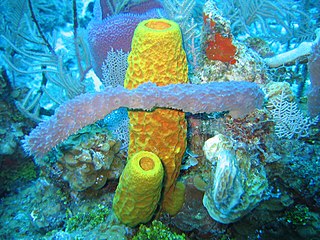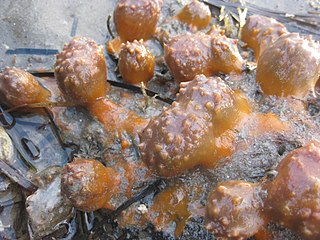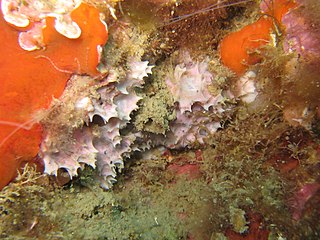
Sponges or sea sponges are primarily marine invertebrates of the metazoan phylum Porifera, a basal animal clade and a sister taxon of the diploblasts. They are sessile filter feeders that are bound to the seabed, and are one of the most ancient members of macrobenthos, with many historical species being important reef-building organisms.

Hexactinellid sponges are sponges with a skeleton made of four- and/or six-pointed siliceous spicules, often referred to as glass sponges. They are usually classified along with other sponges in the phylum Porifera, but some researchers consider them sufficiently distinct to deserve their own phylum, Symplasma. Some experts believe glass sponges are the longest-lived animals on earth; these scientists tentatively estimate a maximum age of up to 15,000 years.

SpongeBob SquarePants is a fictional character and the protagonist of Nickelodeon's eponymous American animated television series. Voiced by Tom Kenny, he is characterized by his optimism and childlike attitude. SpongeBob is a denizen of Bikini Bottom, where he regularly gets into absurd and humorous scenarios.

Baked Alaska, also known as Bombe Alaska, omelette norvégienne, omelette surprise, or omelette sibérienne depending on the country, is a dessert consisting of ice cream and cake topped with browned meringue. The dish is made of ice cream placed in a pie dish, lined with slices of sponge cake or Christmas pudding, and topped with meringue. After having been placed in the freezer, the entire dessert is then placed in an extremely hot oven for a brief time, long enough to firm and caramelize the meringue but not long enough to begin melting the ice cream. Another common method of browning the meringue is to torch the dessert, sometimes even lighting it on fire for presentational purposes.

Demosponges (Demospongiae) are the most diverse class in the phylum Porifera. They include greater than 90% of all species of sponges with nearly 8,800 species worldwide. They are sponges with a soft body that covers a hard, often massive skeleton made of calcium carbonate, either aragonite or calcite. They are predominantly leuconoid in structure. Their "skeletons" are made of spicules consisting of fibers of the protein spongin, the mineral silica, or both. Where spicules of silica are present, they have a different shape from those in the otherwise similar glass sponges. Some species, in particular from the Antarctic, obtain the silica for spicule building from the ingestion of siliceous diatoms.

SpongeBob SquarePants is an American animated television series created by marine science educator and animator Stephen Hillenburg for Nickelodeon. It first aired as a sneak peek after the 1999 Kids' Choice Awards on May 1, 1999, and officially premiered on July 17, 1999. It chronicles the adventures of SpongeBob SquarePants and his aquatic friends in the underwater city of Bikini Bottom.

Halichondriidae is a family of sea sponges belonging to the order Suberitida. These sponges have a skeleton consisting of dense bundles of spicules occurring in a more or less random pattern.

Lyssacinosida is an order of glass sponges (Hexactinellida) belonging to the subclass Hexasterophora. These sponges can be recognized by their parenchymal spicules usually being unconnected, unlike in other sponges in the subclass where the spicules form a more or less tightly connected skeleton. Lyssacine sponges have existed since the Upper Ordovician, and three families are still alive today. The Venus' flower basket is one of the most well-known and culturally significant of the glass sponges.

Sponge diving is underwater diving to collect soft natural sponges for human use.

Geodiidae is a family of sea sponges.
James Yate Johnson was an English naturalist.

Ancorinidae is a family of marine sponges belonging to the order of Tetractinellida.

Aaptos is a genus of sea sponges in the family Suberitidae.

August Denayrouze (1837–1883) was an inventor of a demand valve for control of breathing air supply, and one of the inventors of a diving suit, along with Benoît Rouquayrol.

Euplectellidae is a family of glass sponges (Hexactinellids) belonging to the order Lyssacinosa, first represented in the Ordovician fossil record, substantially older than molecular estimates of the clade's age.

Dysideidae is a family of sea sponges in the order Dictyoceratida.
Sceptrulophora is an order of hexactinellid sponges. They are characterized by sceptrules, a type of microsclere with a single straight rod terminating at a bundle of spines or knobs. An anchor- or nail-shaped sceptrule is called a clavule. A fork-shaped sceptrule, ending at a few large tines, is called a scopule. A broom-shaped sceptrule, ending at many small bristles, is called a sarule.















